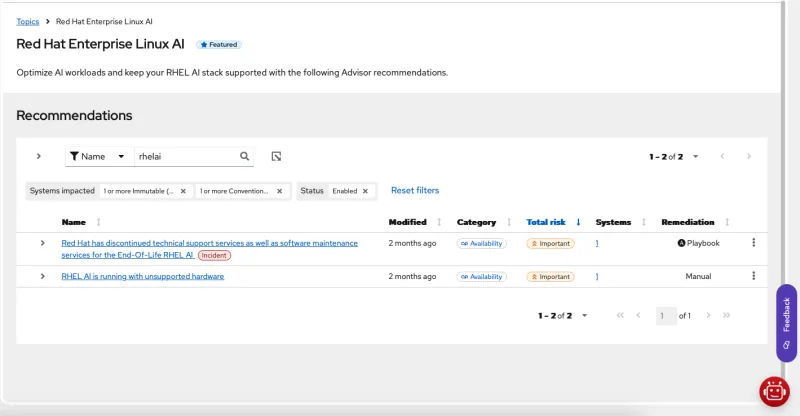As deployments of Red Hat Enterprise Linux AI (RHEL AI) workloads grow, Red Hat has been working to create a new set of recommendations to help RHEL AI administrators streamline operations. Connecting a RHEL AI system to Insights remains simple, as with any other RHEL system. To register, run this command:
$ rhc connectOnce registered, there's no further action required. You can immediately see your findings for this host at console.redhat.com/insights/advisor and benefit from the new set of RHEL AI recommendations. Read more in Configuring accounts for RHEL AI or use the Red Hat Insights registration assistant to help you get started.
New Red Hat Insights recommendations for RHEL AI
RHEL AI is based on the same underlying image as traditional RHEL, but it's purposefully built and tested as an appliance. Modifications to the image itself aren't expected, nor recommended. This has led us to adjust existing recommendations in Red Hat Insights to accommodate the unique characteristics of RHEL AI, mostly due to bootc upgrades only preserving contents of the /etc and /var directories. We've modified the resolution steps and detection logic of existing recommendations to avoid incompatibilities with RHEL AI.
New recommendations designed especially for RHEL AI workloads cover a wide range. You can see them in the Red Hat Enterprise Linux AI topic within Red Hat Insights Advisor.

Supported hardware
RHEL AI requires high-performance capacity to support all phases of the LAB model alignment methodology, like model fine-tuning, synthetic data generation and AI model serving. It's important to make sure a RHEL AI system has the resources it needs and runs on supported hardware. Red Hat Insights Advisor is now capable of detecting unsupported hardware and alerting customers about this suboptimal setup.
To learn more about hardware requirements, read Red Hat Enterprise Linux AI hardware requirements.
Supported RHEL AI version
Because RHEL AI is rapidly developing, bug fixes and new feature development are aimed at the latest versions of the product. Keeping up with the latest supported version can be a challenge, so Red Hat Insights keeps an eye on the currently supported versions of RHEL AI and alerts you whenever it detects an unsupported version in your environment.

RHEL AI image updates
RHEL AI is built on image mode RHEL and bootable container technology (bootc), which relies on pulling images from Red Hat's container registry. To avoid facing bootc authentication problems, it's recommended to log in to redhat.registry.io and make a copy of /run/containers/0/auth.json to /etc/ostree . Red Hat Insights helps with precisely this task, alerting you when the file is missing or empty.
Power supply of GPUs
When a GPU is not receiving adequate power, it results in a downward throttling of its clock speed. As a result, Instructlab’s training and synthetic data generation performance decreases. Insights can detect the hardware power brake slowdown of certain GPU brands and alert about it.
Deploy AI with confidence
These new recommendations demonstrate our commitment to supporting the growth of RHEL AI workloads and ensuring that you have a smooth day-2 operations experience when managing RHEL AI with Red Hat Insights.
Try deploying RHEL AI through our product trial and connect it to Red Hat Insights.
제품 체험판
Red Hat Enterprise Linux AI | 제품 체험판
저자 소개
With more than 10 years of experience in the software industry, Stefan Bunciak is currently the Product Manager for Red Hat Insights. He completed his master's degree in Informatics at Masaryk University in Brno and is skilled in project and people management, quality engineering, and software development. In his spare time, he plays violin in a folklore band.
유사한 검색 결과
Smarter troubleshooting with the new MCP server for Red Hat Enterprise Linux (now in developer preview)
Navigating secure AI deployment: Architecture for enhancing AI system security and safety
Technically Speaking | Build a production-ready AI toolbox
Technically Speaking | Platform engineering for AI agents
채널별 검색
오토메이션
기술, 팀, 인프라를 위한 IT 자동화 최신 동향
인공지능
고객이 어디서나 AI 워크로드를 실행할 수 있도록 지원하는 플랫폼 업데이트
오픈 하이브리드 클라우드
하이브리드 클라우드로 더욱 유연한 미래를 구축하는 방법을 알아보세요
보안
환경과 기술 전반에 걸쳐 리스크를 감소하는 방법에 대한 최신 정보
엣지 컴퓨팅
엣지에서의 운영을 단순화하는 플랫폼 업데이트
인프라
세계적으로 인정받은 기업용 Linux 플랫폼에 대한 최신 정보
애플리케이션
복잡한 애플리케이션에 대한 솔루션 더 보기
가상화
온프레미스와 클라우드 환경에서 워크로드를 유연하게 운영하기 위한 엔터프라이즈 가상화의 미래
